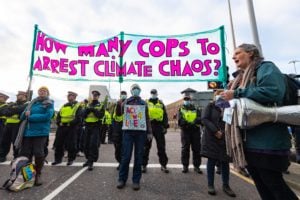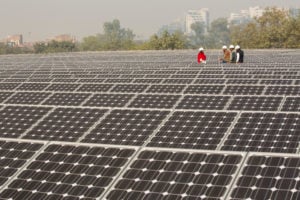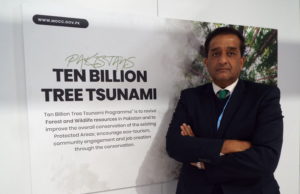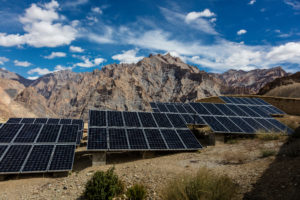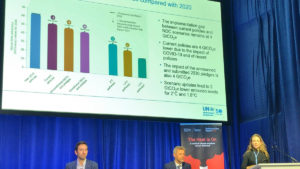A COP delayed by the pandemic ended with the Glasgow Climate Pact. Delayed, diluted and disappointing, the consensus left most countries unhappy, and was strongly criticised by UN Secretary-General Antonio Guterres. Many of the compromises had already been made in the background, but at the last moment India’s environment minister Bhupender Yadav also hammered out a change on coal.
Compromises hide progress at COP26
The many compromises masked the advances made during the fortnight-long summit that went on for an extra day. The rulebook of the 2015 Paris Climate Agreement was finalised. Developing countries can now hope for a functioning market in carbon emissions, through which they can raise money to deal with climate change impacts. India’s Prime Minister Narendra Modi made significant pledges that set the ball rolling as the summit started. China and the US signed a pact to deal with methane, which after carbon dioxide is the commonest of the greenhouse gases entering the atmosphere and warming up the Earth.
More generally, developed countries agreed to significantly raise the funding they provide to developing countries to adapt to climate change impacts. Developed countries had promised to provide USD 100 billion a year by 2020 for developing countries; that has been delayed to 2023. On the positive side, though, more of the money will now go into adaptation – a dire need in developing countries being hit by more and fiercer droughts, storms, floods, landslides and a rising sea due to climate change. So far, most of the money has gone into mitigating greenhouse gas emissions: developing countries that pollute little have received little.
Last-minute hitches
Unfortunately, all the advances were obscured by the final hours of negotiations to finalise the Glasgow Climate Pact – negotiations that spilled over from the backrooms to an open session to discuss the draft. The session was repeatedly delayed as US climate envoy John Kerry went into huddles with his Chinese counterpart, Xie Zhenhua. They were joined by conference president Alok Sharma of the UK and Frans Timmermans, chief climate negotiator of the European Union. Xie’s aides were explaining some changes they had pencilled in the draft, Kerry pulled out his reading glasses, Sharma took notes and everyone looked angry.
Sharma had already called the draft pact a “comprehensive, ambitious and balanced set of outcomes”; this last session was meant for feedback. It soon became clear that to a lot of countries it was none of these things.
[A COP] without concrete outcome on finance cannot be termed a successRepresentative for Guinea at COP26
The biggest problem for most developing countries was that – once again – there was no money on the table to deal with the loss and damage they have suffered, and continue to suffer, due to climate change. There was not even a promise to set up a financial mechanism to deal with the issue. All such moves were blocked by developed countries, led by the US, over fears of incalculable lawsuits if even the idea of financial compensation for historical emissions is accepted by a UN body.
Economic growth pitted against future insecurity
The largest bloc of countries is the G77 and China (which despite its name actually includes 143 nations). As its chair, Guinea’s representative drew some satisfaction from the fact that the pact had at least recognised loss and damage, but expressed “extreme disappointment because the dialogue is very far from concrete measures for loss and damage”. Beyond highlighting the importance of loss and damage, the pact makes no mention of it. Guinea’s representative bluntly stated that a COP (conference of parties, the official name of the summit) “without concrete outcome on finance cannot be termed a success”.
Nonetheless the G77 and China bloc accepted the draft in the “spirit of compromise”, he went on to say. This sentiment was echoed by delegates representing the Least Developed Countries, the African Group, the Alliance of Small Island States and other blocs.
China urged that the pact maintain balance between mitigation and adaptation, and that conference organisers “fully listen to all”.
This point was underscored when the Indian environment minister, Bhupender Yadav, aggressively took on the issue of ending fossil fuel subsidies, pointing out that cooking gas subsidies given to families below the poverty line had helped millions of women in India. “Developing countries are entitled to the responsible use of fossil fuels,” he said. The basic issue of economic growth as a non-negotiable for poorer countries while fossil fuel-driven growth seems to be the cheapest and most reliable way has not been addressed. The failure to do so meant that India’s argument on the right of developing countries – which have contributed the least to climate change in both total and per capita terms – to carbon emissions received oblique support from China, and much more direct support from South Africa, Nigeria, Iran and Venezuela.
This focus on current poverty and recurrent disasters that make a transition difficult contrasted strongly with the views of developed countries. Timmermans of the EU felt not enough was being done to hold global temperature rise from pre-industrial times to 1.5 degrees Celsius. Kerry tried to calm passions by describing the Glasgow Climate Pact as “a powerful statement”, promising to “look forward to conversations on loss and damage” and make “every effort to double adaptation finance”.
The most passionate appeal came from the representative of Maldives. “We accept the incremental steps taken in Glasgow, but the progress is not in line with what is required,” she said. “It will be too late for the Maldives… We put our homes on the line while those who have other options decide when to act.” She implored all countries “to go beyond dialogue and provide action and resources we need.” Referring to the 2C temperature rise ceiling in the Paris Agreement and wanting to give more strength to the lower ceiling, she said: “The difference between 1.5C and 2C is a death sentence for us.”
Sharma wrapped up the informal session by asking all countries not to make any more changes at the final formal plenary session. He described the pact as an “incredibly delicate balance – if any of us tug at that, it will unravel all too easily”.
The final compromise at COP26
There was a break. Then, as the formal closing plenary session was about to start, Yadav went up to the podium and showed Sharma a piece of paper. As Sharma opened the session by seeking consensus on the Glasgow Climate Pact, India introduced a change in the paragraph on fossil fuel subsidies.
The draft paragraph had called upon countries “to accelerate the development, deployment and dissemination of technologies, and the adoption of policies, to transition towards low-emission energy systems, including by rapidly scaling up the deployment of clean power generation and energy efficiency measures, including accelerating efforts towards the phase-out of unabated coal power and inefficient fossil fuel subsidies, recognizing the need for support towards a just transition.”
India proposed that “phase-out” be changed to “phase down”. The paragraph had already been weakened by oil-exporting countries and the US in earlier negotiations, through the insertion of the word “inefficient” before fossil fuel subsidies. This gives countries the ability to say their subsidies are efficient, giving them more time to move from coal to renewables for power generation.
The approved texts… reflect the interests, the conditions, the contradictions and the state of political will in the world todayAntonio Guterres, UN secretary-general
There was strong opposition to the change from developed and many small developing countries. Switzerland led the charge by expressing its “profound disappointment at the text being watered down”. Timmermans said the EU had “wanted to go further on coal. What was read out was a further disappointment.” He said the EU would be “strongly committed” to phasing out coal use “worldwide. This should not stop us.” Mexico expressed its disappointment. So did Marshall Islands, Fiji, Antigua and Barbuda.
Still, the change was accepted and India retained the support it had in the informal session.
Much of the media in developed countries pilloried India for making the change, without acknowledging the earlier insertion of the word “inefficient”.
A COP that did not manage enough
Overall, most governments and observers felt that while the Glasgow COP had made progress, it had not gone far enough to combat climate change, which is already showing its impact with an average global temperature 1.17C above the pre-industrial level. Current pledges to rein in emissions still take the world to a rise of at least 2.4C.
The disappointment was expressed most strongly by UN chief Guterres, whose statement read: “The approved texts are a compromise. They reflect the interests, the conditions, the contradictions and the state of political will in the world today. They take important steps, but unfortunately the collective political will was not enough to overcome some deep contradictions… Our fragile planet is hanging by a thread. We are still knocking on the door of climate catastrophe. It is time to go into emergency mode – or our chance of reaching net zero will itself be zero. I reaffirm my conviction that we must end fossil fuels subsidies. Phase out coal. Put a price on carbon. Build resilience of vulnerable communities against the here and now impacts of climate change. And make good on the USD 100 billion climate finance commitment to support developing countries… Science tells us that the absolute priority must be rapid, deep and sustained emissions reductions in this decade. Specifically – a 45% cut by 2030 compared to 2010 levels… We won’t reach our destination in one day or one conference. But I know we can get there. We are in the fight of our lives.”
